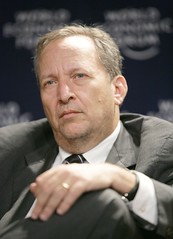In my post, after the third presidential debate, about McCain’s efforts to make “spreading the wealth around” sound like the most ominous thing, I quoted Ezra Klein as saying that “for most folks, spreading the wealth around probably seems like a good idea” right now.
This is correct, Brian Schaffner of the CCPS argued yesterday at his new home on pollster.com. Taking as lead how the ABC/WaPo poll hasn’t shown any movement this month on the question which candidate is trusted more on the question of taxes, he digs up data showing so from a 2003 survey conducted by NPR, the Kaiser Family Foundation and the Kennedy School of Government.
Moreover, in case you’re feeling doubtful about those sponsors, the same thing is largely confirmed by Gallup data, which the polling firm’s in-depth look at the issue on Thursday revealed.
Schaffner argues that the McCain camp’s insistence that Obama’s proposal to raise taxes on the top 5% of income-earners smacks of class struggle and socialism doesn’t drill into much of a popular perception. It isn’t surprising “that McCain hasn’t gotten much traction by criticizing the fact that Obama wants to increase taxes for high income Americans,” Schaffner writes, because the 2003 survey actually showed that most Americans believe “high income people pay less than their fair share”. Over 60% of Independents, over 70% of Democrats and even a plurality of Republicans agreed. Barely over 10% of independents and some 30% of Republicans, on the other hand, thought that high income people “pay more than their fair share”:

The Gallup polling data doesn’t directly address the question whether wealthy Americans pay enough taxes, but it does show a majority of Americans believing that “the distribution of money and wealth in this country” isn’t “fair”. Throughout intermittent polls in the last twenty-odd years, an ample majority opined that wealth should be “more evenly distributed among a larger percentage of the people,” while just 27-37% believed that the current distribution is fair:

Two details strike me in this graph. The opinion that “spreading the wealth around” seems like a good idea isn’t just something that’s coming up “right now”, in the face of a financial crisis; it’s actually been pretty consistent through the years. But there’s two kinds of variations over time.
Continue Reading »
 Almost thirty years ago, an automotive CEO appeared before Congress to ask for help. His company was failing due to poor management decisions, run away gas prices and an overall economic slowdown. If only he could get enough money to stay in business, his company’s next generation of small, fuel efficient cars would hit the market and lead to the company’s success. His company employed 40,000 US workers and laying them off would be a disaster at a time when the economy was already struggling. He’d even work for a dollar a year. Sound familiar?
Almost thirty years ago, an automotive CEO appeared before Congress to ask for help. His company was failing due to poor management decisions, run away gas prices and an overall economic slowdown. If only he could get enough money to stay in business, his company’s next generation of small, fuel efficient cars would hit the market and lead to the company’s success. His company employed 40,000 US workers and laying them off would be a disaster at a time when the economy was already struggling. He’d even work for a dollar a year. Sound familiar? 


